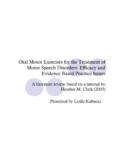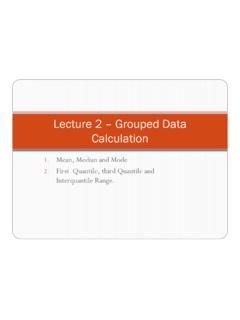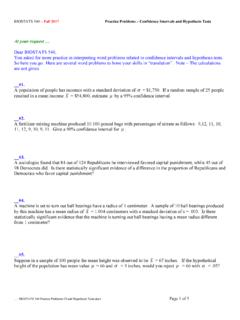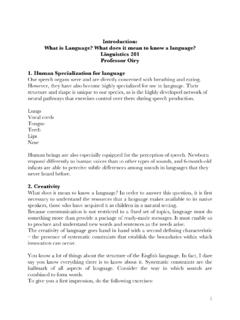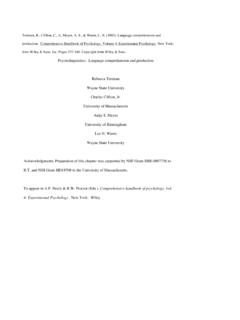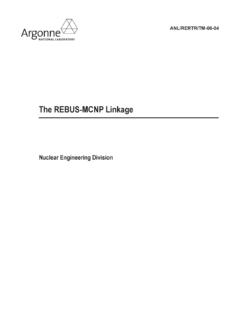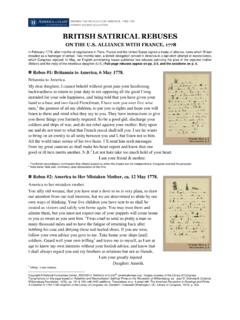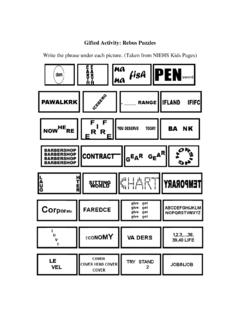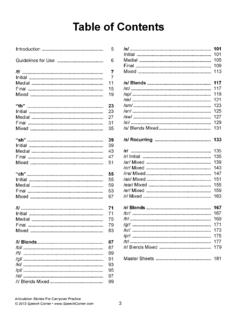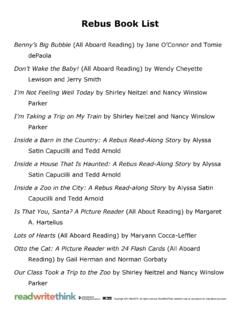Transcription of philosophy in mediis rebus - UMass
1 1 --from Metaphilosophy 32 (2001): 378-394 philosophy in mediis rebus Lynne Rudder Baker How should philosophy be pursued? I want to defend a conception of philosophy in mediis rebus philosophy in the middle of things. The more familiar Latin phrase is in medias res, but Latin distinguishes two readings of in the middle of things. There s the middle of things from which one starts, and there s the middle of things into which one jumps. In medias res is the middle of things into which one jumps; I, however, mean to invoke the middle of things from which one starts. Thus, risking an accusation of pedantry, I use in mediis rebus . 1 So, let us begin in the middle of things. There are two senses in which I think that philosophy must begin in the middle of things: The first is epistemological: I think that the Cartesian ideal of finding an absolute starting point without any presuppositions is illusory.
2 The most that we can do is to be aware of our presuppositions; we cannot eliminate them. Wherever we choose to start, we are in the middle of things epistemologically. The second way in which I think that philosophy must begin in the middle of things is ontological: The objects of my interest at least initially are medium-sized things primarily people, but also nonhuman organisms and other natural objects, and artifacts, and artworks. These are the kinds of things that populate the world that we all unavoidably contend with and care about. And it is that world the everyday life world that I am ultimately interested in understanding. We have no choice but to begin in the middle of things in both ways. The reason that there is no presuppositionless starting point is that one cannot do philosophy unless one has a natural language, and any natural language has countless presuppositions about the way the world is.
3 And all natural languages, to my knowledge, recognize medium-sized objects, some with intentional states. It is medium-sized objects that we have sensory contact with; it is medium-sized objects whose presence or absence we can confirm by observation; it is medium-sized objects that we can manipulate for our own 2 purposes. It is not surprising that natural languages recognize medium-sized objects since survival depends on relations to such things. We are no more able to do philosophy by stepping outside of our language than we are by stepping outside of our evolutionary history. So, it is an inescapable fact that we begin with a body of substantive presuppositions. Moreover, we have reason to have confidence in the truth of these presuppositions. Since natural languages have been forged by eons of successful use, the built-in worldview of medium-sized objects is more likely to be correct, to quote Austin, than any that you or I are likely to think up in our armchairs of an afternoon.
4 2 In this talk, I want to set out and defend an approach to philosophy that begins in the middle of things. I call this approach Practical Realism. In order to make clear what Practical Realism is, I want to locate it with respect to two approaches that seem to me to dominate analytic philosophy today. I ll call the adherents of one of these approaches scientific pragmatists, and the adherents of the other approach conceptual analysts, or more broadly, a priorists. My descriptions of scientific pragmatism and a priorism are idealizations. They are not meant to pick out positions actually espoused by any single philosopher. My purpose is to set out some characteristics of analytic philosophy that I think have been influential, in order to set the stage for Practical Realism. I ll set out the characteristics of the two approaches rather crudely. Scientific Pragmatism First, scientific pragmatism is associated with the slogan that philosophy is continuous with science.
5 Although it is less than obvious what such a slogan might mean, I shall distinguish two versions of what I ll call scientific pragmatism. What they have in common is commitment to the following thesis: (SP) Science is the arbiter of reality (or at least of knowable reality). Where they differ is in how they understand science. On the more robust version of scientific pragmatism, science is construed narrowly to mean the physical sciences. 1 Thanks to Gareth Matthews for pointing out to me the two Latin phrases, and for pressing me to use the more ungainly one in the interest of scholarly precision. 2 A Plea for Excuses, Philosophical Papers (Oxford: OUP, 1961): 123-152. (quote, p. 130) 3 Quine, the progenitor of robust scientific pragmatism, notoriously holds that there could be no intentional science.
6 Closely related to the rejection of intentional science is a strong thesis of the unity of science. To borrow Descartes s image, all the sciences are but branches of a single tree whose trunk is physics. (Descartes, of course, was no scientific pragmatist himself, but his more naturalistic descendants, of the robust variety, hold that the legitimacy of a putative science depends on its relations to physics.) Also associated with scientific pragmatism, and particularly with Quine, is the denial of a comprehensive analytic/synthetic distinction. There is no sharp difference between change of theory and change of meaning. All knowledge claims from common sense to metaphysics are susceptible to empirical disconfirmation by physical science. In the philosophy of mind, robust scientific pragmatism finds its champions in Paul Churchland and the other eliminative materialists. Churchland s idea is that our ordinary ways of thinking of things are just so many folk theories folk psychology, folk biology, folk physics, etc.
7 These folk theories are ripe for replacement by more sophisticated scientific theories with physicalistic taxonomies. A less robust form of scientific pragmatism finds so-called nonreductive materialists among its adherents. Agreeing with their more robust cousins that science is the arbiter of all knowable reality, these less robust scientific pragmatists countenance intentional sciences as well as physical sciences, without supposing that the laws of an intentional science are reducible to the laws of physical science. Although he does not fit exactly, in many ways Jerry Fodor is a contemporary advocate of this less robust scientific pragmatism. Scientific pragmatism is dominant in philosophy of psychology today. Here is the take of a scientific pragmatist on the way that we ordinarily explain each other s behavior in terms of beliefs and desires: , Sam wanted some beer and thought that he could get beer at the corner store; so he went to the corner store.
8 The scientific pragmatist construes such talk as deployment of a folk theory, according to which beliefs and desires are particular inner states (presumably, brain states). Both the more and the less robust scientific pragmatists believe that our folk psychology stands in need of vindication by science. 4 But the more robust scientific pragmatist and his less robust cousin differ in two ways: The first difference here follows the difference in what each is willing to count as science. In order for folk psychology to be vindicated, the more robust scientific pragmatist requires that neuroscience find the relevant beliefs and desires in the brain. The less robust scientific pragmatist requires only that there be a science with intentional laws over computational processes that countenance belief-like and desire-like entities. The less robust scientific pragmatist does not require, or even anticipate, that (in Jerry Fodor s words) empirical theories that appeal to intentional constructs will (or should) be replaced, eventually, by explanations couched in the nonintentional vocabulary of neuroscience.
9 3 So, the first difference between the more robust and the less robust scientific pragmatist concerns what would count as vindication by science of (what they construe as) folk theory. The more robust scientific pragmatist requires that explanations ultimately be expressed in a nonintentional vocabulary; the less robust scientific pragmatists allows explanations to be expressed in an irreducibly intentional vocabulary. The second difference between more and less robust scientific pragmatists concerns their differing assessments of the prospects for vindication of so-called folk theories by science. The less robust scientific pragmatist is more optimistic about the prospects of vindication (in his sense). The more robust scientific pragmatist ( , Paul Churchland) is confident that folk psychology will not be vindicated (in his sense); and he is happy to conclude that our talk of beliefs and desires is just as false as our ancestors talk of witches.
10 (As I argued at great length in my book, Explaining Attitudes, I think that both the more robust and the less robust scientific pragmatist go wrong at the start when they construe attributions of beliefs and desires as deployment of a folk theory of inner ) In sum: Neither the more nor the less robust form of scientific pragmatism has a place for genuine knowledge outside the purview of scientific theories. The two versions differ in what each requires for a theory to be scientific: the more robust version would not countenance any irreducibly intentional science; the less robust version would. Although the less robust version seems to me eminently more plausible than the more 3 Jerry Fodor, The Elm and the Expert (Cambridge MA: MIT/Bradford, 1994): 3. 5 robust version of scientific pragmatism, I am going to focus on the more robust version from which I want to sharply distinguish my own view.
